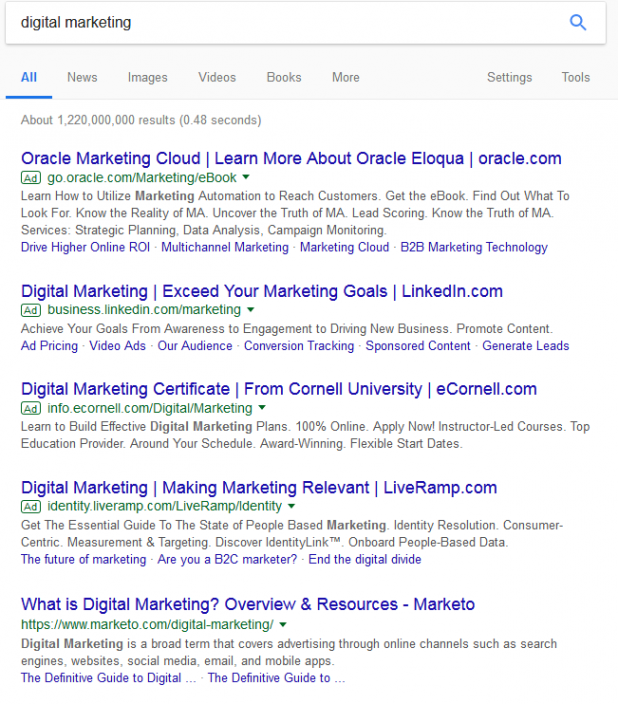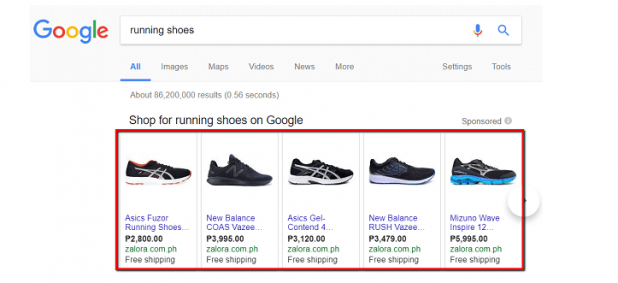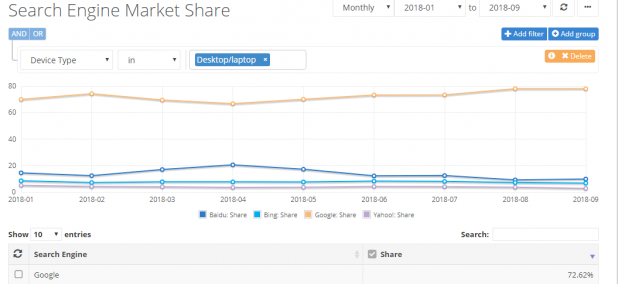With more than 3.5 billion search queries per day, Google reigns supreme in search engine market share. How much do they dominate? According to Net Market Share, 72.62% of all searches from desktops and laptops went to Google during Q1 to Q3 of 2018.
These staggering statistics are enough to explain why businesses put in so much time, effort, and money to get the most of their presence on Google.
When it comes to improving visibility in search results and tapping into the large traffic pool, Google provides two options – Organic Search and Paid Search.
While both the options are great to generate website traffic, they require businesses to adopt completely different strategies. Search Engine Optimization (SEO) is focused on generating organic traffic and Pay Per Click (PPC) is used for paid traffic.
What Is The Difference Between Organic And Paid Search?
When we search for something on Google, the search engine usually provides two types of results – the ones that appear at the top are ads and the ones that appear below them are organic results.
Take a look at the following example:

The top four results that Google provided when we searched digital marketing were ads.
Why does Google place ads above organic results? The simple answer is – money!
The fact that ads are the prime source of revenue for Google is enough to understand why the search engine gives them preference over organic results. Consider ads as front of the line passes that give businesses an edge over competitors and make their webpages rank at the top of search results instantly.
Ads are awesome then… right?
Well, not really.
Ads get you front of the line, but they cost a lot and they’re only there as long as you’re willing to pay for them. Get ranked organically and you’re going to be at the top of the results for a long time.
SEO vs. PPC – What’s Better?
Unfortunately, there is no universally accepted answer to this question. Each of the two has its own advantages and disadvantages. We’ll list them for you and you can make your own decision.
How to Find the Right Strategy for Your Business?
In order to help you determine the right strategy for your business, let’s dig a little deeper and take a look at the benefits and limitations of each.
Search Engine Optimization
SEO focuses on reeling in organic traffic. The only way to drive organic traffic to your website is by ensuring visibility in search results. After all, the higher a website ranks in search results, the more traffic it receives.
Achieving and maintaining search engine ranking is not a one-day job. It is a long-term process that includes a number of tasks, such as keyword and market research, competitor analysis, creating a content strategy, link-building, on-site optimization, maintaining visibility on different social media platforms, creating optimized landing pages, and website monitoring and analysis.
SEO can be done for free. It does, however, cost time and energy.
Most businesses though, choose to hire a professional organization to handle SEO for them. This may cost you from a few hundred to a couple of thousand dollars a month – but that’s significantly lower than what PPC costs.
Why bother when it seems so difficult and takes so much time to deliver results?
The benefits make it worth the hassle.
The Benefits of SEO
The greatest benefit that SEO brings to your business is that the traffic is valuable, targeted traffic.
In PPC, you get billed every time someone clicks on your ad. The visitor could have no intention of buying anything, but you’ll get billed anyway.
In SEO, your website ranks on the keywords you want it to rank on. The higher the ranking of your website, the more traffic you’ll get.
Additionally, SEO helps businesses to build their brand, credibility, establish themselves or their business as an industry thought leader, all the while consistently bringing in super relevant website traffic.
While SEO is not completely free, as it is widely believed, (even if you are not outsourcing the task, it is highly likely that you have hired at least a couple of people to carry out the activities, not to mention the time and effort that you invest), it is far less expensive than running advertisements on search engines to drive traffic.
Drawbacks
There is a lot of competition in some industries, which makes it difficult to achieve and maintain search engine rankings quickly. You’ve also got to be very careful about how you’ve got your website set up. Google continuously makes changes to its search algorithms and you have to make sure there are no red flags on your website.
Bottom Line
Securing top rankings in Google’s organic search results and driving organic traffic to your website requires persistence. Once you’ve got it though, it’ll be easy for you to get loads of traffic, generate leads, and make big money from your website. If this is what you are looking to achieve, you should you should formulate and deploy a strong SEO strategy.
The award-winning SEO expert, Barry Adams, prefers SEO over PPC. Take a look at one his tweets from last year:
1/ So let’s kill this debate once and for all. Organic traffic beats paid traffic for every single metric.
— Barry Adams ? (@badams) May 19, 2017
Pay Per Click
As is evident from its name, PPC is a traffic generating method that requires businesses to pay a certain amount every time someone clicks on their ad.
Even though running ads on Google requires businesses to make a huge investment, paid search has remained popular due to the increased competition in organic search.
Businesses that do not have budget constraints opt for PPC because they want quick results. With PPC, you do not have to create a lot of content, perform off-site optimization, or any other specialized tasks. All you have to do is to bid for a spot on Google and make the payment.
As discussed earlier, with PPC you are preferred over hundreds of other businesses trying to secure top rankings in organic search results. In PPC, the level of competition is not as high – but your competitors might have deeper pockets than yours.
Benefits of PPC
Do you want to increase traffic to your website and generate sales within a very short period of time?
If yes, then investing in ads may be your best bet.
As soon as your ad runs on Google, you start getting results. By securing the top spots in search results, you will be more visible and as a result will have a much higher click through rate.

Statistics show that the conversion rate for paid traffic is much higher than organic traffic. This is because of placement and because most businesses that invest in PPC use great landing pages.
Converting a visitor that’s already made a buying decision is easier and requires less convincing than it takes to convert a person who is still at the awareness or even consideration stage.
Drawbacks
The downsides of PPC is that it costs a lot. In some spots, it might cost you upwards of $15 to acquire a customer. That’s fine if you’ve got a profit margin of $30 or higher per sale, but if not, then PPC is not getting you good ROI.
Add to that the fact that the traffic stops as quickly as you stop funding payment for it.
Bottom Line
If you have short-term goals and want to make quick sales, then investing in PPC ads is the right option for you.
The Viable Course of Action
Both SEO and PPC campaigns help businesses drive traffic.
While many companies decide to stick to one of these options, for a large number of companies it is not about either/or, but rather about creating the right balance between both.
There are many companies that have been continuously investing time and effort in creating great content and also running Google ads whenever they launch a new product or service or run a promotional campaign.
If you want to play it smart like the industry giants, take the middle path and use both the strategies, as and when needed.
While this is the smarter and more viable course of action, striking the right balance between the two types of campaigns can be difficult when you do not have the right skills and expertise. In such a scenario, your best bet is outsourcing the task to a professional digital marketing company such as Content Development Pros.






